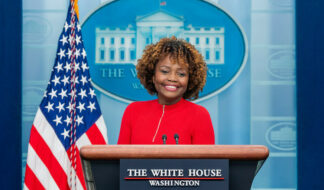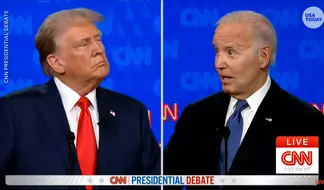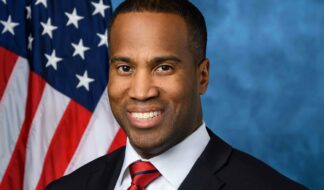Where were you when you heard about the Iowa decision? I was on the phone with friends squealing and giggling like a school girl in love when the ruling was announced, with all six justices agreeing that civil marriage must be judged under the same constitutional standards of equal protection and not under religious doctrines or religious views.
Hell, I was feeling like a school girl in love, in love with the great state of Iowa.
I was also waiting to go into a meeting, in the not-as-enlightened state of Michigan. A meeting made up of community activists, members of the clergy and your friendly neighborhood lesbian.
We were supposed to be talking about how we, as a community, could work closer together – but news of the Iowa decision sent the agenda flying out the window. Unlike similar encounters in the past where same-sex marriage center had taken center stage, the tone of this meeting was different – civil, questioning. More than just tolerant, it was enlightening.
I was not totally surprised having spent a lot of time lately talking with diverse groups, mostly straight, about LGBT equality in the most unusual places.
It began with a visit to the State Capitol to speak with members of the 4-H Club. I know a lot about many things but new precious little about the 4-H. I had the vague notion that it had something to do with farming and wondered why this group would want to talk with representatives of the LGBT community. OK, even I have heard the obscene remarks lumping pedophilia, bestiality and homosexuality together as part of the scare tactics used to confuse issues around LGBT rights, but I had yet to meet any gay person who knew that much about animal husbandry let alone practiced bestiality.
Not wanting to be caught off guard, I did a little research and found that 4-H is a community of six million young people across America learning leadership, citizenship and life skills focused on three areas: One is science, engineering and technology; another is healthy living; and the third is citizenship.
But I wasn't totally off base with the farming. The 4-H began around the start of the 20th century in the work of several people in different parts of the United States who were concerned about young people. Researchers at experiment stations of the land-grant college system and USDA saw that adults in the farming community did not readily accept new agricultural discoveries. But educators found that youth would "experiment" with these new ideas and then share their experiences and successes with the adults, so rural youth programs became a way to introduce new agriculture technology to the adults.
Well, the group of around 20 students didn't have questions about animals or technology. They wanted to talk about marriage – gay marriage.
There were the usual "getting to know the gay" questions.
Q: "Were you recruited?"
A: "No and I'm not recruiting."
Q: "You have a son, how did you do that?"
A: "You kids are from the 4-H, Farms, animals – didn't you get that in school?"
Q: "I see you have on a ring, are you married?
A: "No, I am denied that right here in Michigan."
Ice broken, the rest of our time was spent talking about marriage equality. The good news was they got it. Totally got it. Life on the farm will never be the same.
Next there was the "Young Women, Strong Leaders" conference at Wayne State University. Although I would like to believe I am still one of the young women, on this day I participated as a strong leader, a mentor. There were no LGBT issues on the agenda but it provided another perhaps more crucial way we can advance LGBT rights – by being out as leaders in our community at-large.
Whether as an entrepreneur, an athlete, a teacher, being a mentor, working collaboratively for the betterment of the community at-large or just being a good neighbor, being out as a proud LGBT person living, working and loving in the same community of not just our allies but those who have fallen victim to the scare tactics of bigotry is one of the strongest tools we have to pave the road to true equality.
So by Friday, I was ready to talk collaboration, cooperation and community. And it all was going well. We discussed calmly the separation of church and state, the differences between civil marriage and the religious marriage ceremony – even how many people had been fooled by the language of Prop. 2 and acknowledged the unexpected consequences for many LGBT families with the attacks on domestic partnership.
It was a lively discussion with everyone participating but one. His silence spoke volumes.
The last straw was when I expressed hope that one day we would repeal the discriminatory amendment that denied marriage equality in Michigan. "So you want to change the law now. You need to be living by the law of god. That's what's wrong with this country – living by the law of man not the law of god," he said. He then began spouting scripture supporting his belief that any recognition of same-sex unions was sin, as was homosexuality. "That's what it says in my bible," he said. He ended by holding his bible up in the air as if to chastise the rest for having such sinful thoughts and eyeing me as if to caste the devil out.
We won in Iowa, but the fight is far from over. Critics of the Supreme Court's decision – including conservative religious leaders – call the decision an "unwarranted social engineering" and an attack on "the good that marriage offers to society."
At meetings, in churches, around kitchen tables and in the media around the country, those claiming a moral authority are standing, bible in hand, proclaiming hell fire and eternal damnation if LGBT Americans enjoy the same equal rights as other Americans. They're quoting scripture to incite bigots and hate mongers while using guilt and fear to intimidate the weak.
The fight is not over but time is on our side. The tide is turning. One day equality will trump bigotry in all the land.









